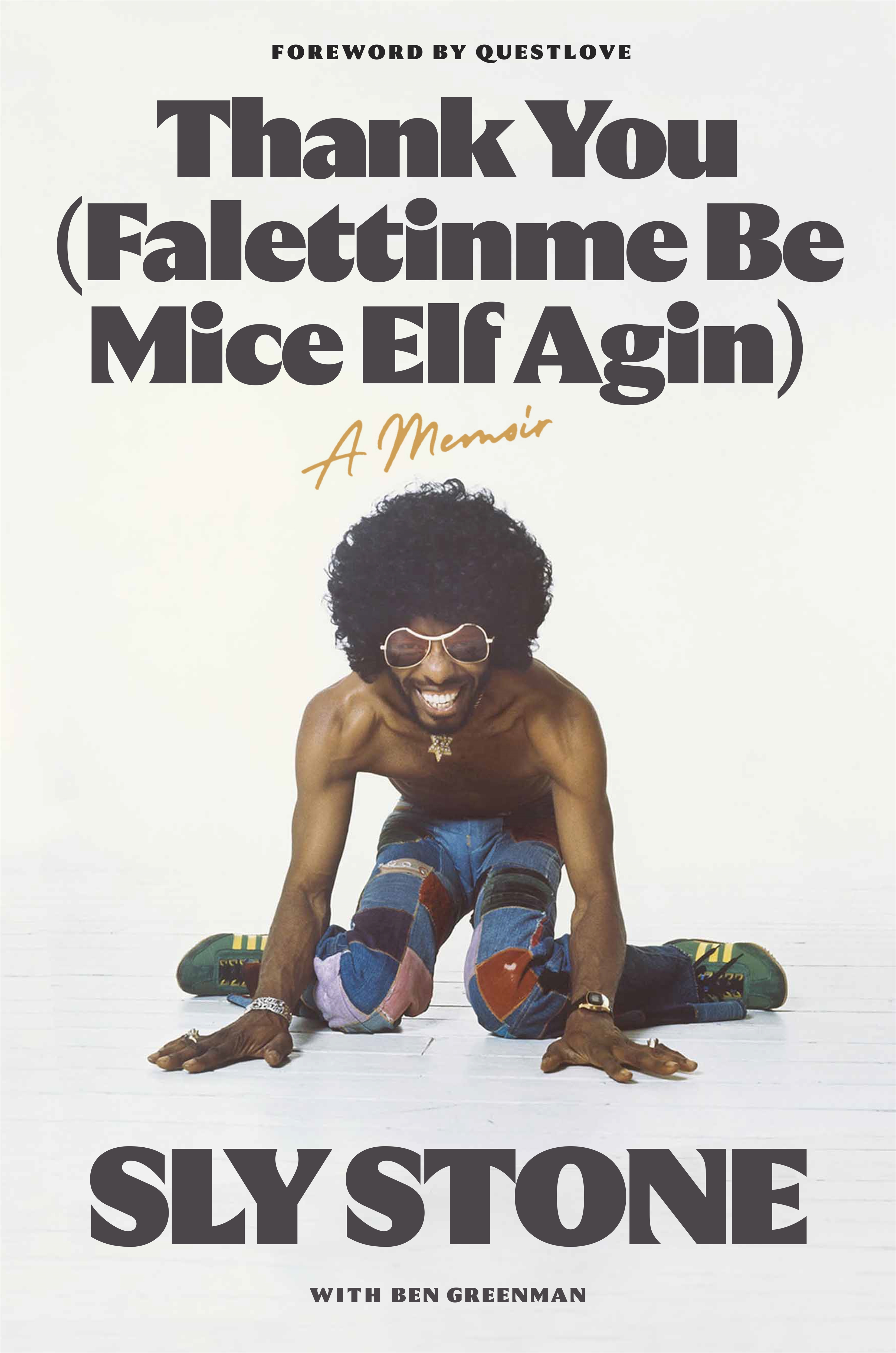
On October 17, MCD and AUWA published Sly Stone’s long awaited memoir, Thank You (Falettinme Mice Elf Agin), with a foreward from Questlove. Here, Ben Greenman, the book’s cowriter, provides his top ten Sly songs.
Sly and the Family Stone’s output started in 1967, and depending on how you look at it, ran to around 1974 (with the release of Small Talk) or through to the early eighties (that would add the solo album High on You, the poorly received Heard Ya Missed Me Well I’m Back, the comeback-styled Back on the Right Track, and Ain’t But the One Way). It’s filled with massive singles and just as many strong album cuts. Listing the best is a fool’s errand, and varies from day to day, but here’s today’s readout.
“Thank You (Falettinme be Mice Elf Agin)” (1969)
There is no other answer, is there? There’s never been a meaner and leaner groove, and the lyrics sum up nearly every way in which the sixties (and its prophets) swung—and sometimes missed. And it’s a song that comes pre-loaded with its own (d)evolution: the slowed-down version on There’s a Riot Goin’ On, “Thank You For Talking To Me Africa,” goes from surge to dirge. It’s deep the way things are when they are buried.
“In Time” (1973)
Sly’s songwriting could be simple or it could be complex, and it was rarely as twistily compelling as on the opening track to Fresh. The lyrics here are a master class in self-aware wordplay, with puns, paradoxes, and pinpoint aim, and the rhythms are ten times more flabbergasting.
“Sylvester” (1982)
It’s not much of a song if. it’s a song at all: a tiny fragment on the last proper album Sly ever made. But it has unearthly insight carried along by earthy vocals. If gospel was psychology, it would be this song.
“Everyday People” (1969)
How do you make a perfect pop song? It’s not a rhetorical question. It’s a legitimate question, because not everyone can do it, and Sly did it many times over. This song floated out ahead of the Stand! record, and in some ways it’s not even that representative of it: it’s less dense, willfully childlike in some ways. And it’s an anthem in the best sense, with a message that, more than fifty years later, will still put a lump in your throat every time you contemplate man’s inhumanity to man.
“Hot Fun in the Summertime” (1970)
Sly says it’s not a cynical song commenting on summer unrest but rather a straightforward ballad about seasonal bliss. Okay, maybe. Either way, though, it’s a peerlessly lovely ballad, with top-flight vocals from everyone and a melody that sticks to your ribs.
“Que Sera Sera” (1973)
Sly and the Family Stone didn’t often cover other people’s songs. Here, they did, brilliantly, in what was both a funky take on a lily-white song and a nod to Doris Day, who Sly knew through her son Terry Melcher and was the subject of (consistently denied) romantic rumors.
“Into My Own Thing” (1968)
Sly and the Family Stone’s music was both of its time and timeless, and this song is a perfect example. It’s a manifesto of individuality that returned to prominence in 2000, when Fatboy Slim sampled it for “Weapon of Choice.” This wasn’t the only time sampling served as a force of resurrection: Sly and the Family Stone songs were also used memorably in LL Cool J’s “Mama Said Knock You Out,” Janet Jackson’s “Rhythm Nation,” and others.
“Family Affair” (1971)
Ask people to name one song that they associate with Sly and the Family Stone, and a great many will name this great song, which anatomizes the dynamics of relationships, whether romantic or musical. It’s also one of those songs that gets into your bones immediately: hear it once, and it’s like you’ve heard it a thousand times.
“Underdog” (1967)
Sly and the Family Stone burst out of the gate with this barnburner, which has everything and then some: passionate soul vocals, a social conscience, a dense arrangement filled with sonic tricks, snippets of nursery rhymes. The record that it anchored, A Whole New Thing, wouldn’t really take off, but it remains a huge achievement and a sign of things to come.
“What Was I Thinking In My Head” (1976)
After 1974’s Fresh, Sly’s output doesn’t get much love. There were some hits and near-hits on 1975’s High on You (“I Get High on You,” “Crossword Puzzle”), which was credited as a Sly solo record, but the following year’s album, Heard Ya Missed Me, Well I’m Back, was considered a dud. It’s not. The lyrics are sharper than they are credited with being, and the band Sly put together to replace (impersonate?) the original Family Stone does better than yeoman’s work. The title song leads things off, but the idiosyncratic second song is the keeper. What’s that “in my head” doing in the title? Is it redundant? Brilliant? Only Sly knows for sure.


